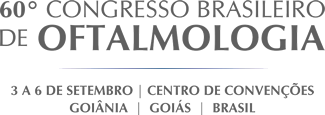Sessão de Encontro com o Autor – Tema Livre
Código: P91
Área Técnica: Uveites / AIDS
INSTITUIÇÃO ONDE FOI REALIZADO O TRABALHO
- Principal: Hospital das Clinicas da Faculdade de Medicina da Universidade de São Paulo
AUTORES
- CELSO MORITA (Interesse Comercial:NÃO)
- Viviane M. Sakata (Interesse Comercial:NÃO)
- Sergio L.G Pimentel (Interesse Comercial:NÃO)
- Marcelo M. Lavezzo (Interesse Comercial:NÃO)
- Smairah F. Abdallah (Interesse Comercial:NÃO)
- Carlos E. Hirata (Interesse Comercial:NÃO)
- Joyce H Yamamoto (Interesse Comercial:NÃO)
Título
VISUAL OUTCOMES OF INTRAVITREAL BEVACIZUMAB ASSOCIATED WITH SYSTEMIC IMMUNOSUPPRESSION IN CHOROIDAL NEOVASCULARIZATION IN VOGT-KOYANAGI-HARADA DISEASE - A PROSPECTIVE STUDY
Objetivo
Purpose: Choroidal neovascularization (CNV) in Vogt-Koyanagi-Harada disease (VKHD) is associated with poor vision and there is no standard therapy. This prospective study assesses the effectiveness of intravitreal (IV) bevacizumab associated to systemic immunosuppressants in the treatment of CNV in VKHD.
Método
Methods: Active CNV was defined by angiography and optical coherence tomography findings. Anterior chamber cells and/or optic disc leakage in fluorescein angiography characterized disease activity. Treatment protocol consisted of three monthly IV bevacizumab injections as a loading dose; if intra/subretinal fluid (IRF) persisted, further injections were proceeded besides increment in systemic immunosuppression. Outcomes at 6 and 12 months were visual acuity (VA), OCT parameters (central foveal thickness-CFT and Macular Volume-MV) and analysis of IRF.
Resultado
Results: Seven eyes of six patients were included (mean disease duration 33 mo, range14-63). Five patients (five eyes) completed 12 months of follow-up. At CNV diagnosis, two patients (two eyes) had active disease; three patients were under immunosuppression. Immunosuppressants introduction and increment was necessary in all cases at 6 and 12 months endpoints. All five patients (five eyes) that completed 12 mo of follow-up received 12 IV bevacizumab injections. CFT and IRF diminished but IRF persisted in all eyes at the end of 12 mo follow-up. VA improved in four out of five eyes; VA loss was not observed in any case.
Conclusão
Conclusion: IV Bevacizumab has a fast but temporary effect in VA recovery and regression of CNV. Thus, intensive systemic immunossupression was necessary in all cases denoting the inflammatory nature of CNV in VKHD.









